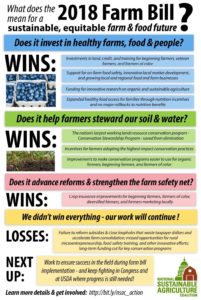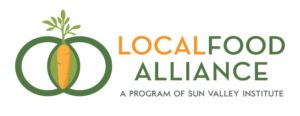$1 billion per page.
“On December 20, DT signed the Agricultural Improvement Act of 2018 (commonly knows as the Farm Bill) into law. The bill, projected to cost $28 billion over the next five years, is one of the largest spending packages in the country, doling out money for low-income nutrition assistance, crop insurance, commodity subsidies and conservation programs, among other things. Learn more about the triumphs and failures of the new farm bill from Marion Nestle on Food Politics and Dan Imhoff on Civil Eats.” -Local Food Alliance
The bill takes up 807 pages, with a table of contents of 11 pages. It will cost taxpayers $867 billion over ten years. That’s more than $1 billion per page.
by Marion Nestle
SNAP
Recall that more than 75% of Farm Bill expenditures go for SNAP—The Supplemental Nutrition Assistance Program (formerly Food Stamps).
The “bipartisan win”? Attempts to cut SNAP expenditures and introduce work requirements failed to pass (whew), although Congress is still working on ways to cut enrollments.
Commodity payments
The bill allows payments to more distant relatives of farm owners—cousins, nieces, nephews—a gift to the already rich. Payments can still go to those earning more than $900,000 a year in adjusted gross income (sigh).
Organics
The bill authorizes $395 million in research funding over the next 10 years, and small amounts for data collection, offset of certification costs, and technology upgrades. But the bill weakens restrictions on chemicals that can be used in organic production.
Hemp
The bill grants $2 million a year for support of hemp as a crop, and authorizes USDA to study the economic viability of its domestic production and sale. It also authorizes Indian tribes (that’s the term the bill uses) to grow hemp.
Cuba
The bill allows funding for USDA trade promotion programs in Cuba.
The Managers recognize that expanding trade with Cuba not only represents an opportunity for American farmers and ranchers, but also a chance to improve engagement with the Cuban people in support of democratic ideas and human rights…The Managers expect that the Secretary will work closely with eligible trade organizations to educate them about allowable activities to improve exports to Cuba under the Market Access and Foreign Market Development Cooperator Programs.
https://www.foodpolitics.com/2018/12/the-2018-farm-bill-more-of-the-same-old-same-old/
https://civileats.com/2018/12/13/despite-small-wins-the-new-farm-bill-is-a-failure-of-imagination/
JOIN THE GRANGE
Founded in 1924, Upper Big Wood River Grange, aka the Hailey Grange, is a nonprofit, nonpartisan, fraternal organization that advocates for rural America and agriculture. It also is home to the Wood River Seed Library’s Seed Vault. Learn about becoming a member at the Grange’s January 17 Meeting and Annual New Member Drive – 7:15-8:45pm, at Grange Hall, 609 South 3rd Ave. in Hailey. Guest speaker Aimée Christensen, founder and executive director of Sun Valley Institute, will talk about resiliency and food-related risks and opportunities before us.




Leave a Reply